Meta Keywords Best Practices
Although meta keywords have lost their significance in modern SEO strategies, other types of meta tags continue to play pivotal roles.


Meta Keywords Best Practices
Unlocking SEO Potential with Effective Meta Tag Utilization
Understanding Meta Tags in Modern SEO
In today's digital landscape, optimizing website metadata remains a crucial aspect of enhancing search engine visibility and ranking. Although meta keywords have lost their significance in modern SEO strategies, other types of meta tags continue to play pivotal roles. This article delves into the complexities of meta tags, their relevance, and best practices for their use, ensuring readers are equipped with a solid understanding of how to optimize their metadata for effective SEO.
Relevance of Meta Keywords in Contemporary SEO
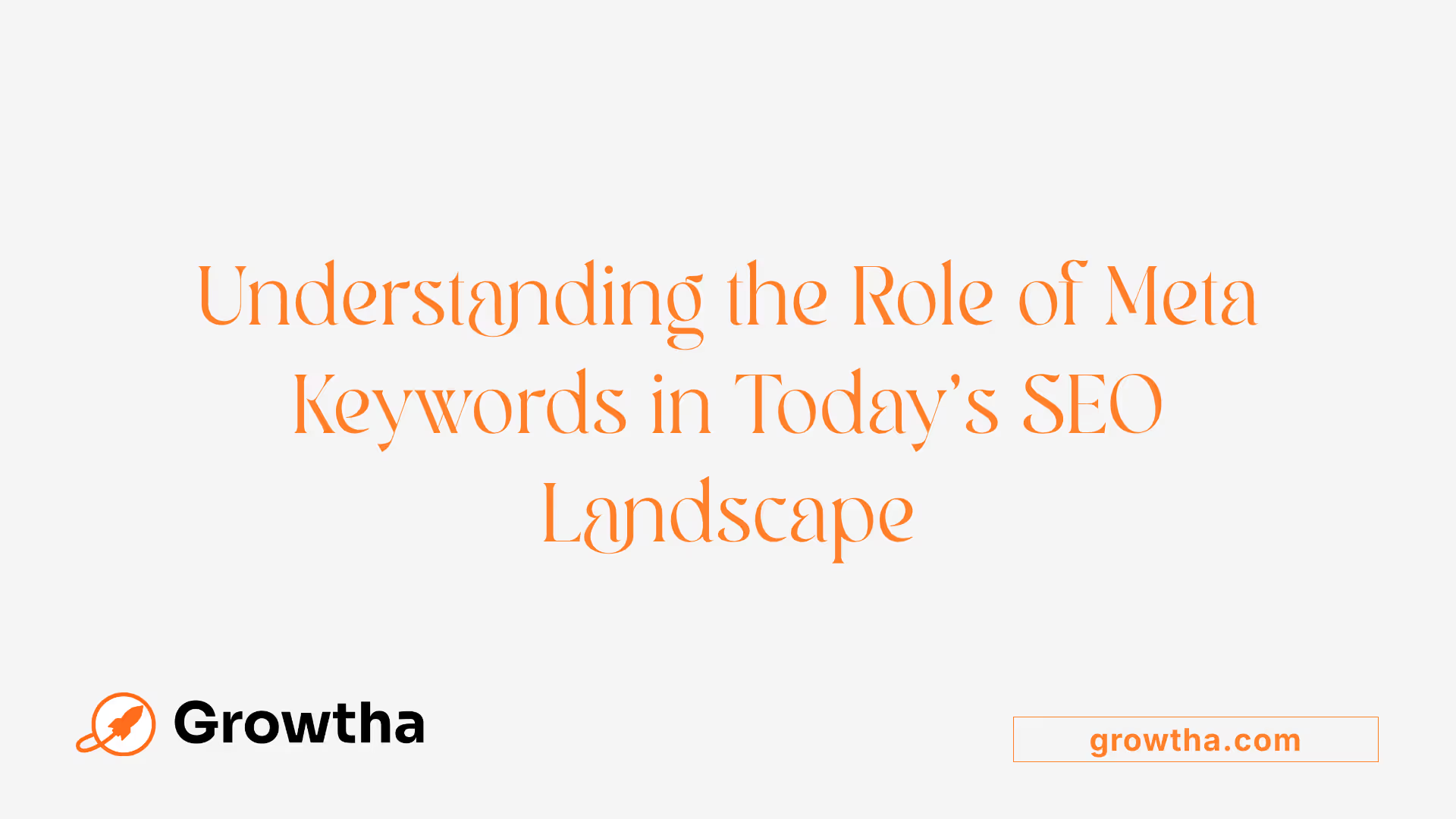
Historical Significance of Meta Keywords
In the early days of search engine optimization (SEO), meta keywords played a pivotal role in helping search engines categorize web pages. These keywords were essentially snippets of text embedded in the HTML code, meant to guide search engines regarding a webpage's main topics. However, as the web evolved, the widespread practice of keyword stuffing—where site owners filled these tags with irrelevant terms—led to search engines like Google reevaluating the significance of meta keywords. By 2009, Google explicitly confirmed that it no longer utilized the meta keywords tag for rankings, citing rampant misuse as the reason.
Current Relevance in SEO
As of 2023, meta keywords have been deemed irrelevant in the landscape of SEO. Major search engines have moved away from relying on these tags, prioritizing content quality and user engagement instead. Experts indicate that the inclusion of relevant, insightful content and keywords—both short-tail and long-tail—is far more effective than attempting to optimize with the defunct meta keywords. While some search engines like Yandex and Baidu may still consider meta keywords in specific contexts, the consensus among SEO professionals is clear: focusing on comprehensive keyword strategies and enhancing user experience should take precedence over using meta keywords. As such, marketers are advised to leverage relevant keywords within meta titles and descriptions, along with utilizing structured data to improve visibility electronically, rather than relying on meta keywords.
Future Outlook of Meta Keywords
Looking ahead to 2024 and beyond, the outlook for meta keywords is bleak. They are unlikely to regain any prominence in SEO strategies due to their historical misuse and the ongoing development of advanced methodologies by search engines to assess content relevance without needing such tags. Instead, the future of SEO will focus more on holistic keyword strategies that prioritize user intent and engagement. Elements such as structured data, well-crafted meta descriptions, and comprehensive keyword analysis through tools like Latent Semantic Indexing are set to dominate the SEO landscape. Given that meta keywords have been largely ineffective for over a decade, any attempts to incorporate them into SEO best practices will likely continue to be not just obsolete but potentially detrimental.
Overview of Meta Keywords' Impact on SEO Strategies
Factor Historical Importance Current/Relevance Impact Meta Keywords Integral in early SEO phase Considered irrelevant for ranking SEO Focus Shift Keyword density and counts Content quality and user engagement Search Engine Algorithms Basic ranking mechanisms Advanced relevance assessment techniques
Exploring Different Types of Meta Tags
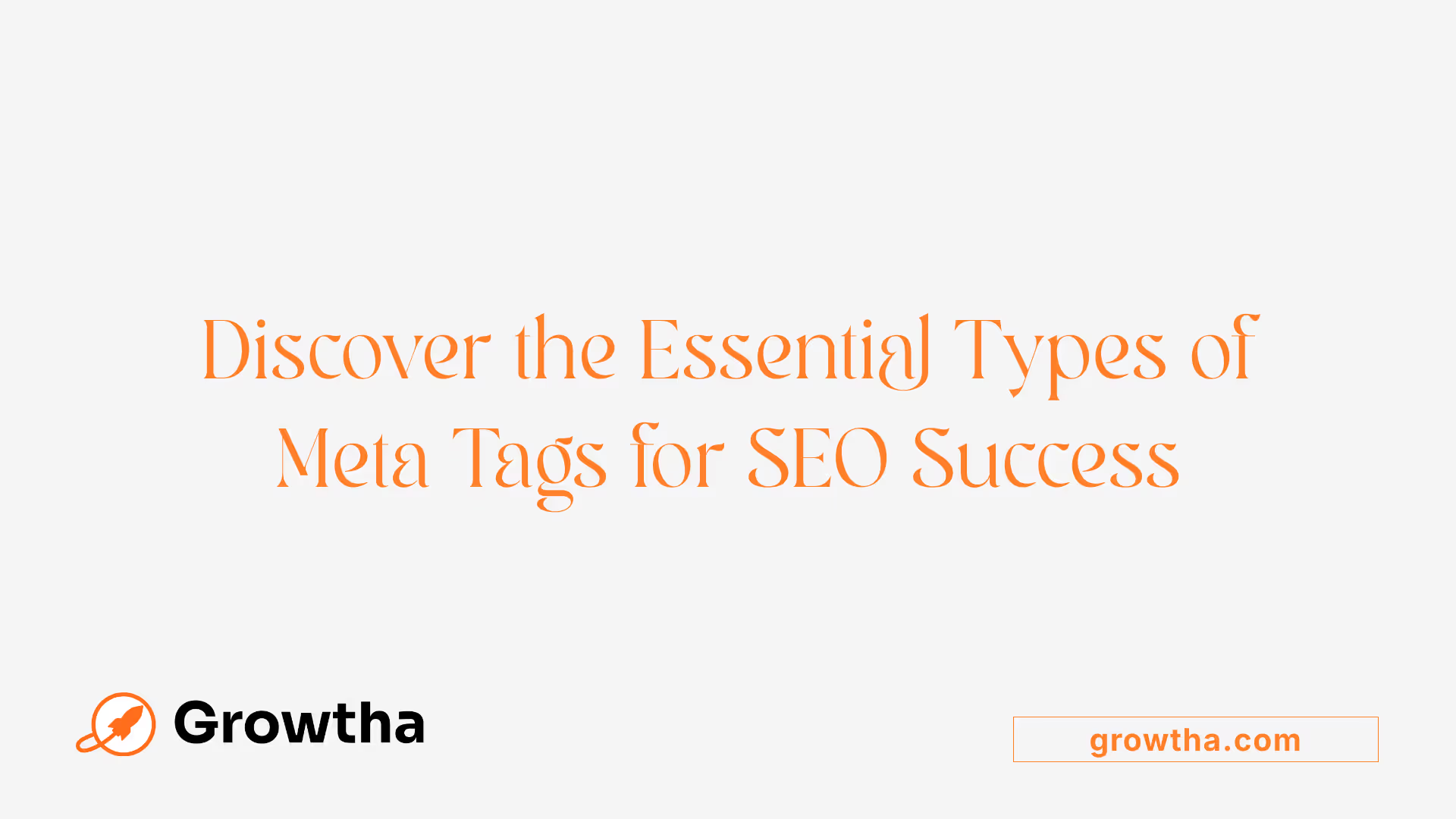
What are the different types of meta tags and their purposes?
Meta tags are snippets of HTML that provide essential information about a webpage to search engines and users, thereby significantly influencing SEO and visibility on search engine results pages (SERPs). Key types of meta tags include Title Tags, which summarize the page's topic and are crucial for attracting clicks; Meta Description Tags, which provide a brief overview of the content and help improve click-through rates by enticing users; and Robots Meta Tags, which instruct search engines on whether to index a page or follow its links.
The Viewport Meta Tag ensures that webpages are optimized for mobile devices, critical for user experience and search rankings in an era of mobile-first indexing. Additionally, social media meta tags like Open Graph and Twitter Card tags enhance how pages are displayed when shared, thus improving engagement across platforms. Other significant meta tags include Canonical Tags, which help manage duplicate content issues by designating the preferred version of a page, and Hreflang Tags, which indicate the language and geographical targeting for content, ensuring users access the appropriate version.
Overall, the thoughtful implementation of these meta tags is essential for boosting SEO effectiveness and enhancing user engagement.
Impact on SEO and user experience
The meticulous use of meta tags significantly influences both SEO performance and user experience. Properly optimized title and description tags attract more clicks by providing concise, relevant information that encourages user engagement. For instance, search engines often utilize meta descriptions when generating snippets, summarizing page content in a way that can either entice or deter potential visitors.
Conversely, inadequate or duplicated meta tags can confuse search engines, leading to lower rankings or missed indexing opportunities. Moreover, tags like the Robots Meta Tag allow webmasters to manage which pages are indexed or followed, giving more control over a site's search visibility. Mobile optimization enabled by the Viewport Meta Tag further improves user experience, adapting content for various devices and ensuring accessibility, which is now a critical ranking factor. Thus, incorporating the right meta tags not only aids in formatting search results but also enhances the overall user journey, rendering it an indispensable aspect of modern web strategy.
Summary of Key Meta Tags
Meta Tag Type Purpose SEO Impact Title Tag Summarizes the page's topic Critical for attracting clicks and ranking Meta Description Tag Briefly describes the content Improves click-through rates Robots Meta Tag Controls indexing and following of links Affects search visibility and site control Viewport Meta Tag Ensures mobile responsiveness Essential for mobile-first indexing Canonical Tag Indicates the preferred page version Helps manage duplicate content issues
Crafting Effective Meta Keywords
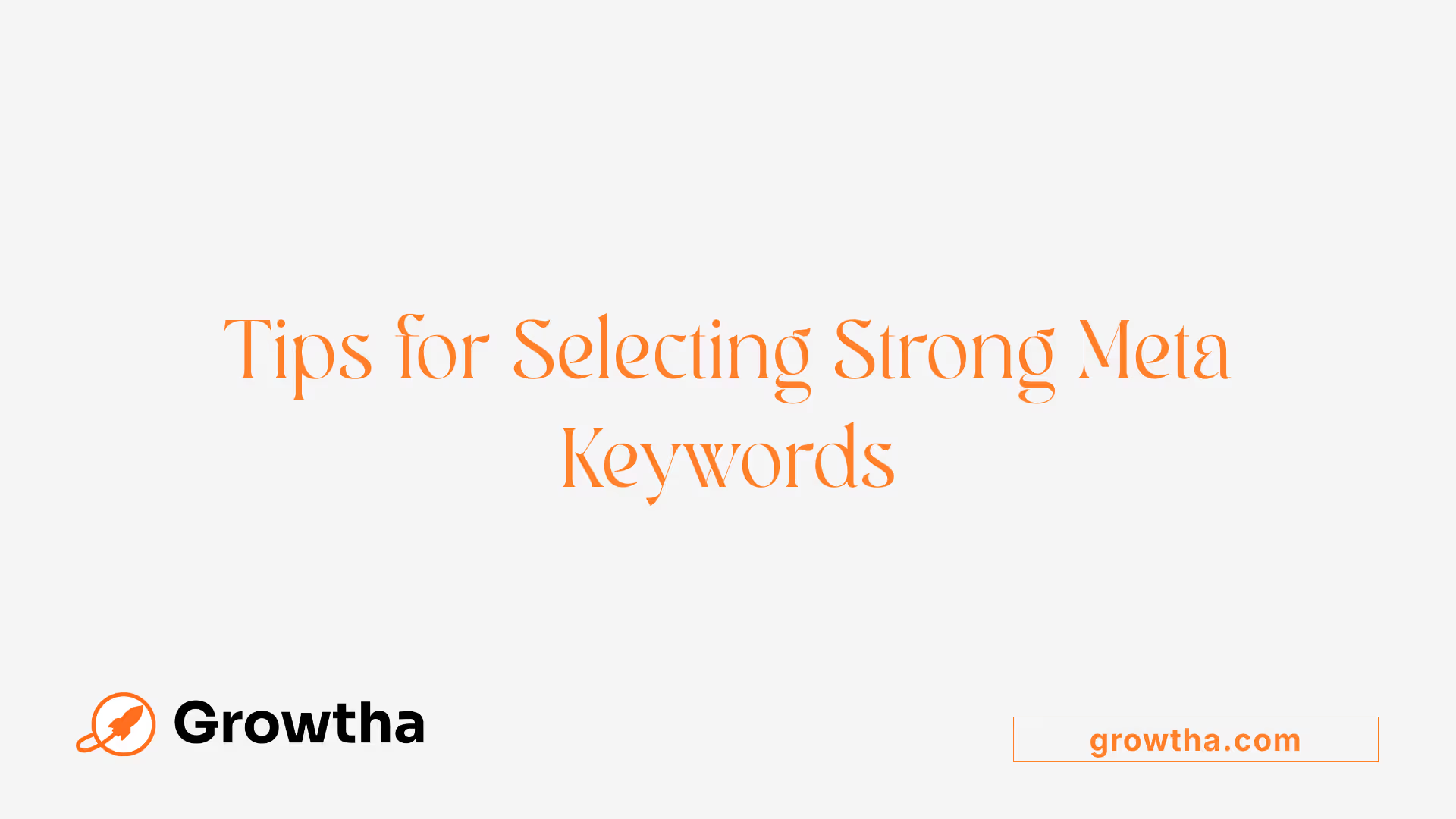
What should meta keywords be?
Meta keywords should be specific terms that accurately represent the content of your web page, although they have diminished in importance for SEO due to potential misuse. While many search engines, including Google, place minimal weight on meta keywords, they can still aid in content organization and targeting specific audiences. It’s advisable to use around 10 relevant meta keywords per page, including long-tail keywords and common misspellings to enhance search relevance. For example, using keywords that align closely with the user’s search intent can help drive targeted traffic. Tools like WordStream's Free Keyword Tool can assist in discovering effective keywords, providing valuable data on search volume and competition levels. Ultimately, while meta keywords are not as critical as they once were, their appropriate use can still contribute to a comprehensive SEO strategy.
Choosing relevant meta keywords
Choosing the right meta keywords is essential, as ineffective keywords can misrepresent your page and lead to irrelevant traffic. It’s crucial to avoid keyword stuffing and focus instead on a natural integration of keywords relevant to your content. Additionally, the selected keywords should accurately reflect the topics covered on the page to prevent user dissatisfaction due to high bounce rates. As a general rule, using 5-10 relevant keywords per page is advised, drawing from user search behavior and historical data about what brings visitors to your site. Optimizing these keywords requires regular updates to align with trending terms and shifting audience interests.
Impact on web page organization and audience targeting
The impact of well-chosen meta keywords extends to effectively organizing your web pages and ensuring they resonate with your target audience. By carefully selecting keywords, webmasters can ensure their content is discoverable by users interested in those terms, thus enhancing the relevance of their pages in search results. Ensuring that the keywords reflect both the primary focus and related concepts of the page can help in building a cohesive user experience. Furthermore, audience targeting is reinforced as the keywords can correspond to specifically identified user needs or interests, drawing in a precise segment of potential visitors.
Meta Keywords Overview
Aspect Description Best Practices Purpose Aid search engines in content categorization. Use specific, relevant keywords. Importance Diminished in SEO relevance, especially for Google. Focus on keywords that match user intent. Usage Recommended usage of about 5-10 keywords per page. Incorporate long-tail keywords.
Best Practices for Using Meta Tags Effectively
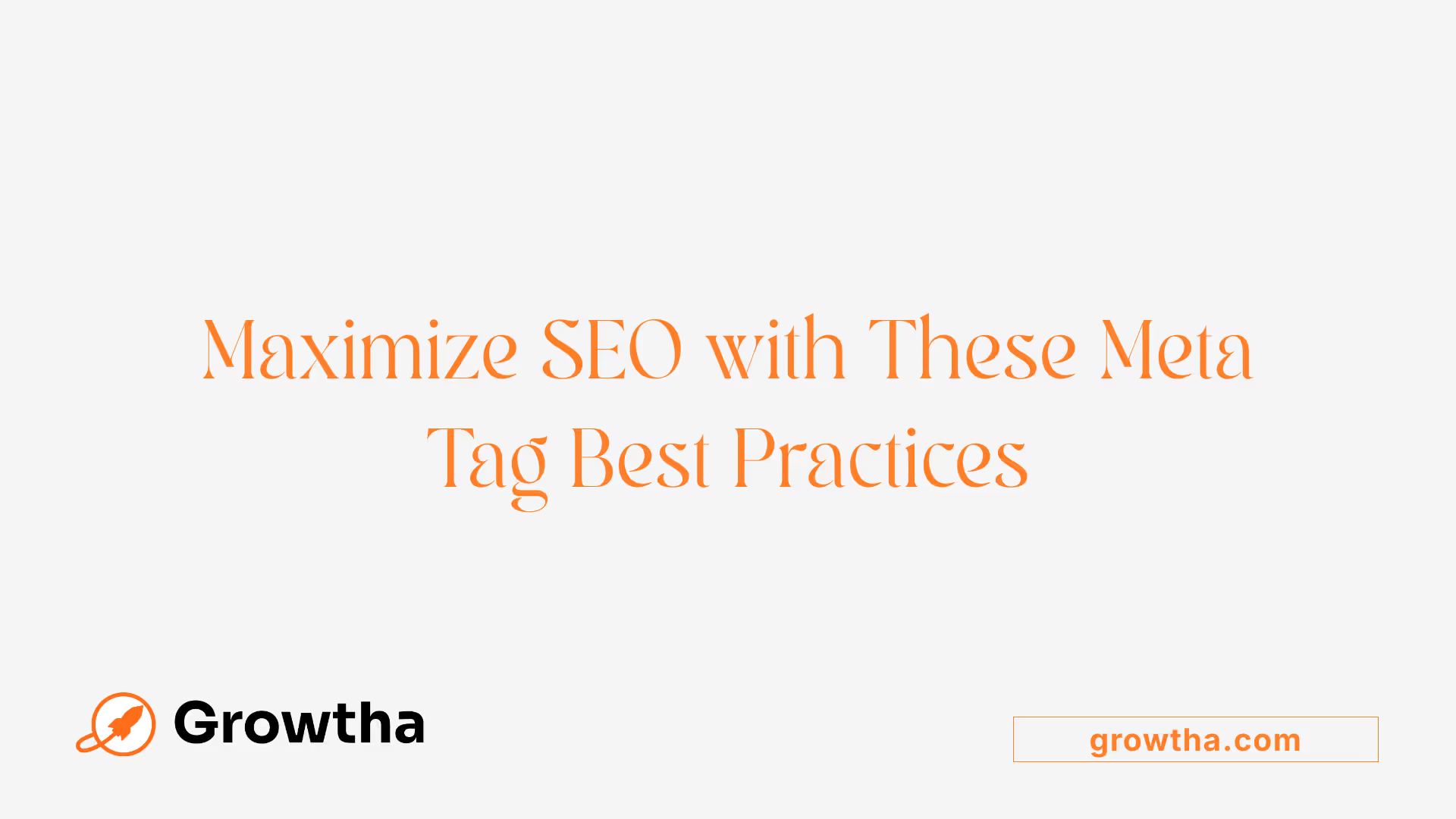
How to Use Meta Tags Properly?
To use meta tags properly, it's vital to include essential tags in the <head> section of your HTML. Start with the meta title, ensuring it is unique and descriptive, ideally kept between 50 and 60 characters. Incorporate your target keywords early in the title to improve visibility and relevance in search results. The meta description should follow suit, summarizing the page content effectively and typically around 105 characters. Craft these descriptions with primary keywords to enhance click-through rates. Additionally, utilize the robots meta tag to instruct search engines on indexing behavior, determining which pages should be indexed or which links to be followed, crucial for effective SEO management. Implement the viewport meta tag as well; it ensures your website is mobile-friendly, an increasingly significant factor as search engines adopt mobile-first indexing.
Character Limits and Importance of Keywords
Character limits are crucial in meta tags. The recommended length for meta titles ranges from 50 to 60 characters, while meta descriptions should be concise, ideally around 150-160 characters to avoid truncation in search results. Incorporating relevant keywords into these tags not only aids search engines but attracts user attention. Use clear and compelling language in descriptions, employing a call to action, such as 'Learn more' or 'Get it now', to engage potential visitors. Properly structured meta tags, coupled with keyword optimization, can significantly influence your site's visibility in search results, thus improving SEO performance.
Guidelines for Crafting Meta Descriptions
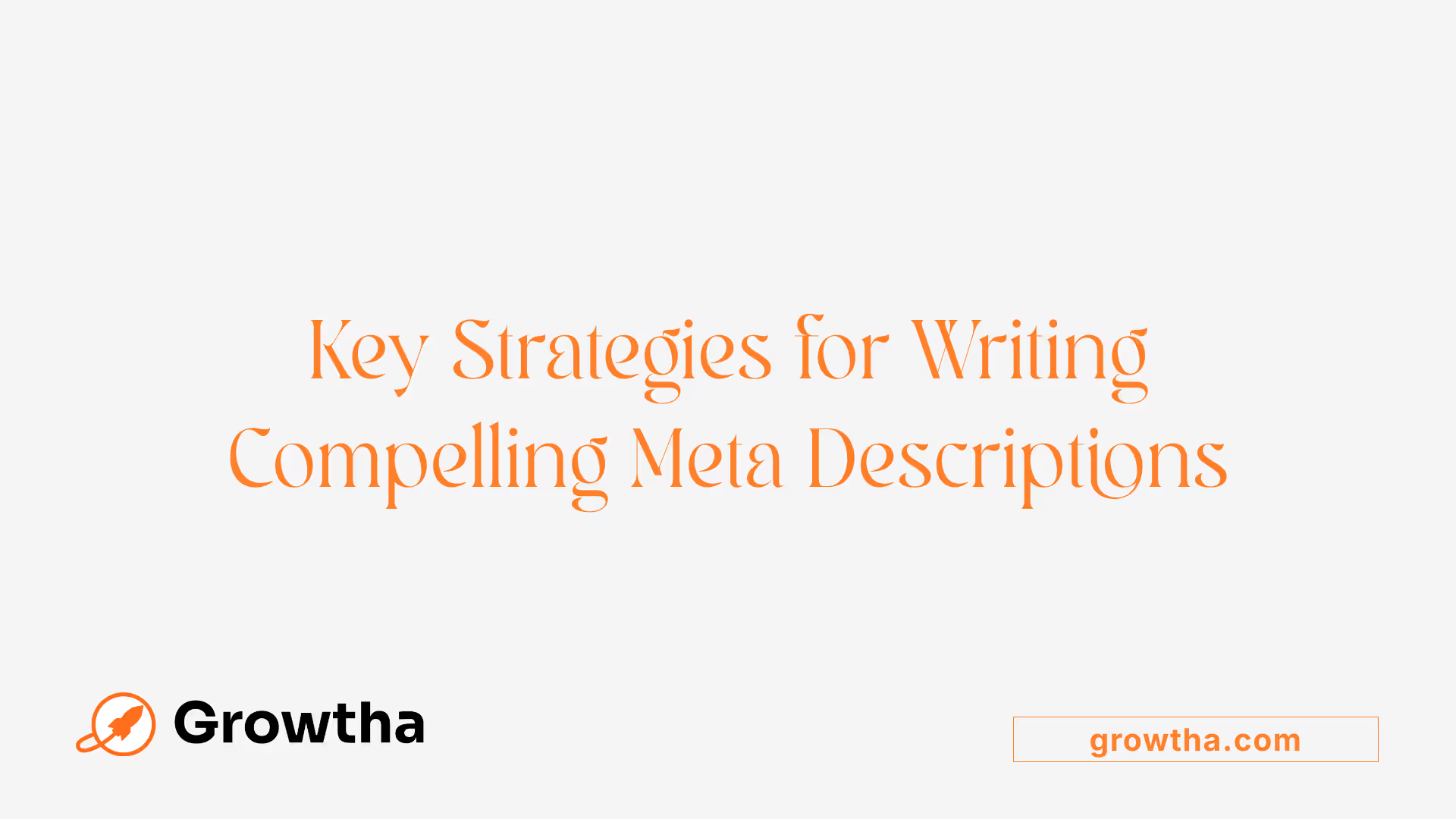
Role of meta descriptions in SEO
Meta descriptions serve a critical function in search engine optimization (SEO) as they summarize a webpage's content. Appearing beneath the title in search results, they create a crucial first impression for potential visitors, effectively acting as marketing pitches for web pages. When optimally crafted, meta descriptions can enhance click-through rates (CTR) significantly. Although they do not directly impact page rankings, their ability to attract user clicks can lead to improved performance in search results, influencing how Google evaluates various pages based on engagement.
Tips for writing effective meta descriptions
Tip Description Impact Keep it concise Limit meta descriptions to around 150-160 characters to prevent truncation. Ensures visibility and clarity in search results. Reflect content accurately Describe the page's content in a straightforward manner, aligning with user intent. Reduces bounce rates and enhances user trust. Include a call to action Phrase like 'Learn more' or 'Get it now' encourage users to click through. Increases engagement and CTR. Utilize relevant keywords Incorporating keywords naturally within the text without stuffing. Improves relevance and can catch eye of users. Ensure uniqueness Craft a unique meta description for each page to differentiate them. Helps in ranking and click differentiation.
Key Strategies for Creating Winning Meta Titles
Impact of meta titles on SEO
Meta titles are pivotal for search engine optimization (SEO), acting as the primary consideration search engines use to categorize web pages. They serve as the first point of contact in search results, leading to higher click-through rates (CTR) when crafted effectively. This direct influence on visibility can significantly affect a webpage's overall traffic and user engagement. When users encounter a well-structured, relevant title, they are more likely to click through to the site, which can ultimately enhance the page's ranking in the search engine results pages (SERPs). Thus, a compelling meta title not only draws in traffic but also plays a crucial role in user perception of the site's content.
What are best practices for meta titles?
| Best Practice | Description | Reasoning || --- | --- | --- || Keep Titles Concise | Aim for 50-60 characters to avoid truncation. | Ensures full visibility in search results. || Incorporate Keywords Early | Place primary keywords at the beginning of the title. | Enhances SEO effectiveness and captures user interest. || Ensure Uniqueness | Each page title should be distinct. | Avoids confusion among users and improves CTR. || Use Clear Formatting | Separate the page name from the brand with symbols like |. | Improves readability and professionalism. || Avoid Keyword Stuffing | Integrate keywords naturally without overloading. | Maintains clarity and prevents penalties from search engines. |
Tools to Enhance the Generation of Meta Descriptions
Are there tools for generating meta descriptions?
Yes, there are tools for generating meta descriptions. One popular option is Ahrefs' Meta Description Generator, which helps users create SEO-friendly descriptions to improve search engine visibility. This tool uses AI technology to generate concise and compelling snippets that incorporate relevant keywords, enhancing click-through rates. Additionally, it offers multiple meta description options tailored to specific keywords, allowing for customization and optimization. By utilizing such tools, website owners and marketers can save time and improve SEO performance effectively.
Benefits for SEO strategy
Implementing effective meta description tools can significantly impact overall SEO strategy. They streamline the process of crafting high-quality, targeted meta descriptions, which are critical for enticing users in search results. Optimized descriptions can lead to improved click-through rates (CTR) and enhance user engagement by accurately portraying page content. This strategy not only helps to better position a website in SERPs but also aligns with Google's guidelines, ensuring that meta descriptions contribute positively to the site's visibility.
Tool Name Features Benefits Ahrefs Meta Description Generator AI-driven generation; keyword optimization Improves CTR; saves time SEMrush Customizable snippets; competitor analysis Enhances SEO strategy; unique descriptions Yoast SEO Optimization suggestions in WordPress User-friendly; ensures compliance with best practices
The Role of Title Tags in Elevating CTR and SEO
Why Unique Title Tags Matter
Title tags serve as the webpage's headline, presenting the first impression to both search engines and users. Their uniqueness is crucial; search engines utilize them to classify and prioritize content while users depend on them to discern relevance amid search results. A unique title tag can significantly improve visibility since it differentiates a web page from others, attracting clicks from prospective visitors who find the description appealing. Importantly, title tags should ideally remain concise—under 60 characters—to prevent truncation, ensuring that the entire title is visible on search engine results pages (SERPs).
SEO Advantages of Optimizing Title Tags
The effectiveness of optimized title tags extends beyond basic recognition. Incorporating relevant keywords at the beginning of a title can enhance its chances of ranking higher in search results. This method not only aids search engines in comprehending page content but also resonates with user interests. Experts suggest crafting compelling title tags can raise click-through rates (CTR); when users identify keyword relevance, they are more likely to engage with the content. Overall, optimized title tags lead to higher traffic, benefiting both SEO and user engagement.
Using Robots Meta Tags for SEO Management
How do Robots Tags Direct Search Engine Behavior?
Robots meta tags are crucial for directing search engine crawlers on how to interact with your webpage. They can instruct crawlers to either index or noindex content, and to follow or nofollow links. This capability is essential for managing which pages should be visible in search results and which should remain private or excluded from indexing, thereby optimizing SEO strategies. Using these tags strategically allows webmasters to better control their site's visibility and protect sensitive information.
SEO Strategies Using Robots Meta Tags
Incorporating robots meta tags effectively can enhance your SEO management. For instance, when certain pages have thin or duplicate content, applying a noindex tag prevents search engines from displaying those pages in results, helping to maintain content quality and ranking optimization. Moreover, a strategic use of nofollow can guide crawlers to avoid passing link equity to less important pages, directing visibility to essential content. These practices ensure that search robots work efficiently with your site, promoting better overall SEO performance.
Summary of Robots Meta Tag Strategies
Tag Type Purpose Best Practice noindex Prevents indexing of specific pages Use for thin or seasonal content nofollow Prevents passing link equity Use for untrusted or low-value pages index Allows indexing and following Default setting for most pages
Enhancing Mobile Experience with Viewport Tags
Significance of viewport tags in responsive design
The viewport meta tag is essential in ensuring a website's content is displayed properly on various devices, particularly smartphones and tablets. By defining the viewport's size and scale, this tag allows for a responsive web design, which is critical as mobile traffic continues to rise. Without a viewport tag, webpages may appear zoomed out or require horizontal scrolling, detracting from user experience and engagement. Incorporating this tag creates a seamless transition between desktop and mobile viewing, ultimately fostering user retention.
Impact on SEO and user experience
Search engines like Google prioritize mobile-first indexing, meaning that the mobile version of a site is the primary version considered for rankings. The correct implementation of the viewport meta tag contributes to better SEO performance by enhancing usability for mobile users, which can positively influence metrics such as bounce rate and time on site. As a result, pages with an optimized viewport are likely to rank higher in search results, benefiting from increased visibility. Furthermore, an intuitive user experience leads to improved click-through rates (CTR), solidifying the viewport tag's role in both SEO and web design.
Overview of viewport tags and their importance
Aspect Description Impact Responsive Design Enables content to adjust to screen size. Improves usability on mobile devices. SEO Performance Affects search engine rankings based on mobile optimization. Potentially increases visibility in search results. User Engagement Encourages better navigation and interaction. Lowers bounce rates and fosters user satisfaction.
Social Media Meta Tags and Visibility Enhancement
How Do Social Media Meta Tags Contribute to SEO?
Social media meta tags play a vital role in enhancing a webpage’s visibility on social platforms. These tags, such as Open Graph tags for Facebook and Twitter Cards, control how shared content appears, including titles, descriptions, and images. By optimizing these tags, marketers ensure that when users share links, they are presented attractively, which can significantly increase click-through rates (CTRs). Furthermore, a well-formulated social meta presence not only captures user attention but also invites engagement, leading to enhanced traffic and interaction. This engagement can indirectly benefit SEO by driving social signals back to the site, suggesting relevance and authority to search engines.
What Strategies Optimize Pages for Social Sharing?
To optimize pages for social sharing, it’s crucial to implement best practices for social meta tags. For instance, including clear, engaging headlines and a concise meta description can entice users to click. It's advisable to limit title lengths to about 60 characters to ensure full visibility on all platforms. Additionally, integrating relevant keywords and action-driven language—like 'Discover more' or 'Join us today'—can increase the rate of shares and interactions. These elements contribute to crafting a rich snippet when the page is shared, which enhances its appeal, facilitating improved visibility in both search results and social media feeds.
Summary of Social Media Meta Tags
Tag Purpose Best Practices Open Graph Tags Enhance content display on Facebook Include engaging title, description, and image. Twitter Cards Improve representation on Twitter Make images and descriptions eye-catching. General Social Tags Attract clicks and shares across platforms Utilize keywords and action verbs.
Optimizing Your SEO Strategy with Meta Tags
While the landscape of SEO is ever-evolving, understanding and utilizing meta tags effectively remains crucial in optimizing your online presence. Although meta keywords have become largely obsolete, a strong focus on other meta tags, such as titles and descriptions, as well as leveraging tools and strategies for creating compelling metadata, can lead to improved search engine visibility and user engagement. Adopt these best practices to ensure your site stands out in search results and attracts the desired audience.
References
- Meta Tags For SEO: A Simple Guide For Beginners - HigherVisibility
- How to Write Meta Descriptions | Google Search Central
- SEO Best Practices for Meta Titles & Descriptions - team lewis
- Meta Tags: What They Are & How to Use Them for SEO - Semrush
- Meta Keywords - The Complete 2024 Guide to SEO Optimization ...
- Meta Keywords: What They Are and How They Work - WordStream
- Ultimate Guide to SEO-Friendly Meta Tags for 2024 - SEOwind
- 14 Most Important Meta And HTML Tags You Need To Know For SEO
- Meta Tags for SEO: A Simple Guide for Beginners
- Meta Tags for SEO: Examples & Best Practices - Seattle New Media







